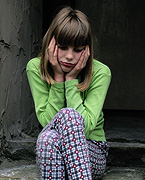Teens Who Self-Harm Need Adult Influences, Professional Help: Expert
In survey, hopelessness was a major factor among kids who attempted suicide.
A new study outlines ways that parents, teachers and medical professionals can identify and help teens at risk for self-injury and suicide.

"For many young people, suicide represents an escape from unbearable situations -- problems that seem impossible to solve or negative emotions that feel overwhelming," Lindsay Taliaferro, assistant professor of health sciences at the University of Missouri, said in a university news release.
"Adults can help these teens dissect their problems, help them develop healthful coping strategies and facilitate access to mental health care so their problems don't seem insurmountable," she said.
Taliaferro analyzed data from more than 60,000 high school students who completed the 2007 Minnesota Student Survey and found that more than 4,000 of them said they had harmed themselves in the past year. Nearly half of those who reported self-injury also had attempted suicide, according to the article in the journal Academic Pediatrics.
"Of the teens who engaged in non-suicidal self injury, hopelessness was a prominent factor that differentiated those who attempted suicide from those who did not have a history of suicide attempts," Taliaferro said.
She noted that many parents, teachers and medical professionals avoid talking to teens about self-harm because they aren't sure how to help.
"Adults don't need to solve all the teens' problems, but they should let the teens know they have safe persons they can talk to," Taliaferro said. "Sometimes just talking about their feelings allows young people to articulate what they're going through and to feel understood, which can provide comfort."
She advised parents to strengthen connections with their teens and to help develop connections between their children and other adults who can be a positive influence.
"One of the most important protective factors against teens engaging in self injury was parent connectedness, and, for females, connections with other prosocial adults also were associated with reduced likelihood of engaging in self injury," Taliaferro said. "Parents are extremely valuable influences in their children's lives."
Although parents are influential in teens' lives, mental health professionals are the best resources for troubled teens, Taliaferro said. Other medical professionals, such as primary care doctors, also can play an important role by identifying teens who self-injure and referring them to mental health specialists and community support systems.
Suicide is the third-leading cause of death for teens in the United States, according to the Centers for Disease Control and Prevention.
Source: HealthDay News
- 437 reads
Human Rights
Ringing FOWPAL’s Peace Bell for the World:Nobel Peace Prize Laureates’ Visions and Actions

Protecting the World’s Cultural Diversity for a Sustainable Future

The Peace Bell Resonates at the 27th Eurasian Economic Summit

Declaration of World Day of the Power of Hope Endorsed by People in 158 Nations

Puppet Show I International Friendship Day 2020

